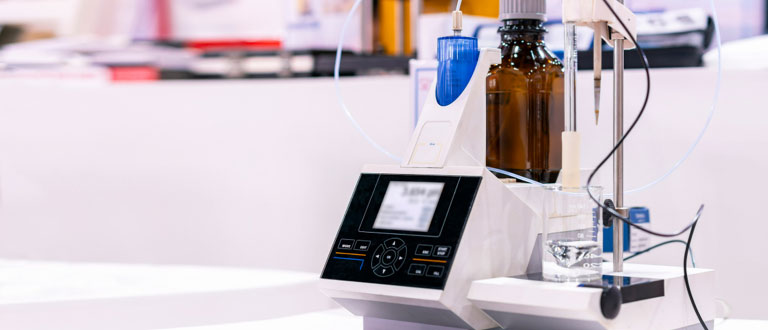Moisture Test, How Does Karl Fischer Titration Work?

When bringing a new food item to shelves, it is important to know the moisture content of your product. This data is necessary when determining shelf life or performing calorie and carbohydrate calculations. Moisture content can be determined for most food items using our standard moisture test. It is the most affordable moisture testing option and A2LA/ISO accredited, making it a widely accepted method across the food industry.
Why Use The Karl Fischer Titration Method??
The standard moisture test relies on Gravimetric Moisture assays and is not appropriate for all types of food samples. Medallion Labs provides an alternative moisture test for samples that contain solvents and volatile ingredients, or that would otherwise be unacceptable for testing in an oven due to ‘skinning.’ In these cases, we use the Karl Fischer Titration method—also known as Moisture by Karl Fischer (MKF) test.
During the Karl Fischer Titration test, water is directly consumed by reaction with the titrant within the conditions of the reaction vessel. Thus Karl Fischer Titration is more selective for water than the traditional oven heating method. The main factor affecting Karl Fischer Titration accuracy is the ease of extracting the water from solid samples into a methanol solvent. We shake solid samples overnight to achieve the maximum extraction of moisture before performing the titration.
How Is Karl Fischer Titration Different?
Our standard Moisture Test is based on gravimetric moisture or a “loss on drying test.” Samples are heated up in an oven and weighed to identify changes caused by evaporation. The amount of weight lost is then reported as the percent of moisture in the sample. While effective, simple, and affordable, this method is not as selective as the titration test. Flavorings, solvents, alcohol, and other volatile materials will also evaporate, causing a change in weight, but none of these are considered water content.
The Karl Fischer Titration test directly measures the water in a sample and nothing else. In the KF Method, the percentage of moisture is determined by automated potentiometric titration with an iodine and sulfur dioxide reagent. Liquid is extracted into an appropriate solvent and is titrated volumetrically. Some labs measure Moisture by Karl Fischer using coulometric titration. Coulometric uses electricity or electrical current to carry out the titration reaction. It is meant for samples with very low levels of water (0.001 to 1%). Medallion Labs does not provide coulometric testing as most food samples have higher water levels.
Will the Standard Moisture Test and Karl Fischer Titration Test Produce Similar Results?
Yes. When a sample is run by the correct moisture oven variation, it should yield a very similar result to Karl Fischer Titration. The variability of these results is dependent on each matrix, but they should be comparable unless the sample is an unacceptable matrix for the oven method.
Submitting a Sample for Karl Fischer Titration
A number of matrices are acceptable for conducting the Karl Fischer Titration test. This list includes, but is not limited to:
- Alcohol
- Butter
- Extracts
- Ethanol
- Fats
- Fish feed
- Flavorings
- Enhancers
- Glycerin
- Liqueur
- Margarine
- Mayonnaise
- Mineral oil
- Mouthwash
- Niacinamide
- Oils
- Pet food
- Propylene glycol
- Raisins w/ glycerin
- Shortening
- Solvents
- Sterols
Medallion Labs will also need a complete sample description of the food sample to deliver accurate results. Be sure to call out compounds that could interfere with the Karl Fischer Titration method. These include:
- Antioxidants
- Reducing agents
- Strong acids
- Strong bases
Special handling may also be needed to extract all water for samples such as dried fruits, fruit leathers, and some specialty carbohydrates.
Karl Fischer Titration Moisture Test
See the technical data sheet for the Karl Fischer Titration Moisture test.
View TestAdditional Water Testing From Medallion Labs
The Water Holding Capacity test is related to moisture content testing. This type of test is run alongside moisture testing and used in result calculations. Developed for grain-based products only, it is applied to powders that are insoluble and readily dispersible in water. Depending on the application, the solvent used can be water or an aqueous solution of salts, weak acids, or weak bases.
The Water Activity test is not related to moisture content testing. It measures how accessible moisture in the sample is to organisms to grow. An example is a dry pasta, which typically has 10–12% moisture. Even with that water content, the Water Activity is typically low, and organisms cannot grow.
Your Reliable Partner for Food Moisture Testing
Food producers need to know the moisture content of their products. Using standard moisture testing or Karl Fischer Titration testing from Medallion Labs, customers receive accurate, reliable, and actionable results to inform their decisions and operations.
When considering Medallion Labs for moisture testing or other lab services, we suggest referring to our tech data sheets and online order form for the latest details. Our breadth of testing options helps you maximize your testing budget by providing the results you seek in a cost-efficient manner.
Medallion Labs is ready to use our testing options, expertise, and skills to meet your testing needs. Connect with us or call 1-800-245-5615 to discuss the criteria and testing needs for your food products.
Let's Get to Work!
Submit your order online and ship your samples today. If you have questions, we are always here to help.
Medallion Labs+
A food testing program designed with mid-market and enterprise food and ingredient manufacturers in mind.